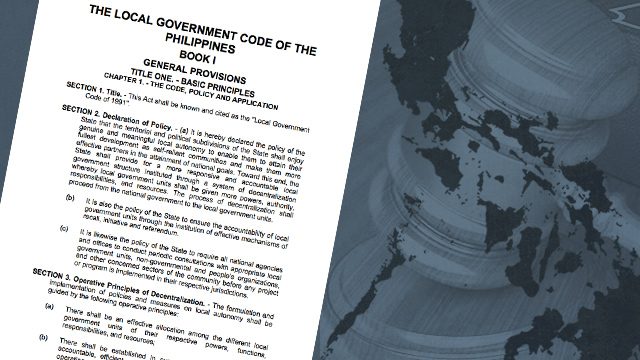SUMMARY
This is AI generated summarization, which may have errors. For context, always refer to the full article.

MANILA, Philippines – October 10, 2016, marks the 25th year of the Local Government Code of the Philippines.
Dubbed the bible of local governance, Republic Act 7160 was signed in 1991 to fulfill state policy, as enshrined in the 1987 Philippine Constitution, to decentralize governance and allow autonomy for local government units (LGUs)
According to Article X Section 3 of the Constitution, the Local Government Code is enacted to provide for a more responsive and accountable structure of local government.
The Code, it added, will provide “a system of decentralization with effective mechanisms of recall, initiative, and referendum, allocate among the different local government units their powers, responsibilities, and resources, and provide for the qualifications, election, appointment and removal, term, salaries, powers and functions and duties of local officials, and all other matters relating to the organization and operation of the local units.”
Journey to enactment
The enactment and implementation of the Local Government Code was not an easy journey.
Considered one of the last legislations of the administration of Corazon Aquino, it took almost 5 years just to get it out of Congress. It was finally signed on October 10, 1991, or 8 months before Aquino stepped down from the presidency.
Implementation, which started in January 1992, became the job of President Fidel Ramos.
The Code, which replaced Batas Pambansa Bilang 337 of former president Ferdinand Marcos, is divided into 4 parts:
- Book I – Basic principles
- Book II – Local taxation and fiscal matters
- Book III – LGU creation, organization, and powers
- Book IV – Transitory, penal, and and implementation provisions of the Code.
However, just like any major legislation, the Local Government Code is not without flaws.
LGUs have these major complaints regarding the Code:
- The LGUs get the smaller share in the internal revenue collection of the national government.
- Responsibilities are devolved from the national agencies to LGUs, but not the corresponding funds.
- Not enough funding is provided for LGUs to implement additional programs and services required by law.
Long-awaited review
In 2014, the Local Government Code started undergoing a comprehensive review to identify problem areas and ways to improve. The review is funded through a loan from the Asian Development Bank (ADB) amounting to $250 million (P12.05 billion)*.
The review, to say the least, was long-awaited. It took 22 years before it was even initiated. This is despite a provision which mandates an evaluation of the Code every 5 years. (READ: Local Government Code almost untouched after 3 presidents)
Section 521 of the Code states that the Congress shall “undertake a mandatory review of this Code at least once every five (5) years and as often as it may deem necessary, with the primary objective of providing a more responsive and accountable local government structure.”
Code reforms nearly happened in 1997. During the administration of Ramos, the code was supposed to be set for review. Several stakeholders, however, proposed a huge number of amendments to the Code which took a lot of work for the congressional oversight committee.
A Newsbreak report in 2004 stated that because of these proposed amendments, “the same gigantic work” done in rewriting the Constitution will be needed. The sheer number of amendments, however, does not mean that the Code was ineffective. (READ: Code Imperfect)
Few provisions amended despite no review
Despite no major review of the Code since 1992, amendments have been introduced through legislation throughout the years.
One such legislation is Republic Act 8185, which says that “5% of estimated revenue from regular sources shall be set aside as annual lump sum appropriations for relief, rehabilitation, reconstruction and other works or services in connection with calamities which may occur during the budget year.”
But even with these small amendments, there is still really no major reform that can improve the 25-year-old Code.
Two years since the ADB-funded review was initiated, and given the focus on federalism by the administration of President Rodrigo Duterte, are we finally going to see “change” in the LGU bible? – Rappler.com
*$1 = P47
Add a comment
How does this make you feel?
There are no comments yet. Add your comment to start the conversation.